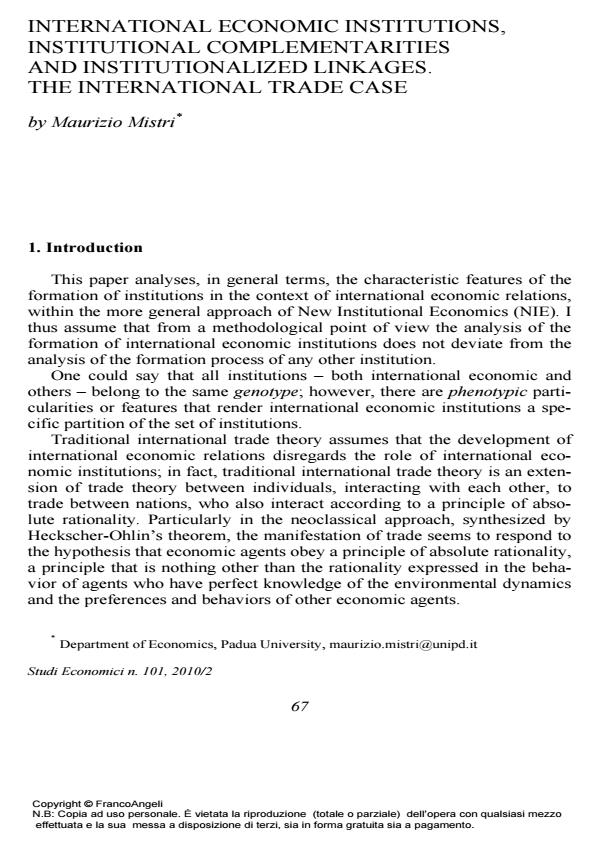International Economic Institutions, Institutional Complementarities and Institutionalized Linkages. The International Trade Case
Titolo Rivista STUDI ECONOMICI
Autori/Curatori Maurizio Mistri
Anno di pubblicazione 2011 Fascicolo 2010/101
Lingua Inglese Numero pagine 24 P. 67-90 Dimensione file 569 KB
DOI 10.3280/STE2010-101004
Il DOI è il codice a barre della proprietà intellettuale: per saperne di più
clicca qui
Qui sotto puoi vedere in anteprima la prima pagina di questo articolo.
Se questo articolo ti interessa, lo puoi acquistare (e scaricare in formato pdf) seguendo le facili indicazioni per acquistare il download credit. Acquista Download Credits per scaricare questo Articolo in formato PDF

FrancoAngeli è membro della Publishers International Linking Association, Inc (PILA)associazione indipendente e non profit per facilitare (attraverso i servizi tecnologici implementati da CrossRef.org) l’accesso degli studiosi ai contenuti digitali nelle pubblicazioni professionali e scientifiche
This paper analyses the forces at the base of the formation processes of international economic institutions following the fundamental New Institutional Economics (NIE) approach. In particular, the paper assumes that new international economic institutions respond to a principle of procedural rationality. This principle indicates that the formation of institutions takes place in an environment dominated by the bounded rationality of agents that produce institutions based on procedural knowledge accumulated over time. Particular attention is dedicated to the relationship between institutional innovation and economic growth. Specialized institutions stem from this relation, on par with the real economy, and generate more and more complex institutional systems. Within the institutionalist approach to the formation of institutions, the paper highlights Aoki’s concepts on "institutionalized linkages" and "institutional complementarity"; these concepts are then correlated to Schelling’s "strategy decomposition" concept; subsequently the forces that lead to institutional changes (Aoki and North) are analyzed. Specifically, in light of North’s approach, conditions are analyzed that determine changes in institutions governing international trade relations deriving from changes in some structural dimensions such as relative price systems. These changes are possible since governments can renegotiate original agreements giving rise to compensations.
Parole chiave:International economic institutions, institutional complementaries, international trade
Jel codes:B52, D71, F02
Maurizio Mistri, International Economic Institutions, Institutional Complementarities and Institutionalized Linkages. The International Trade Case in "STUDI ECONOMICI " 101/2010, pp 67-90, DOI: 10.3280/STE2010-101004